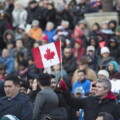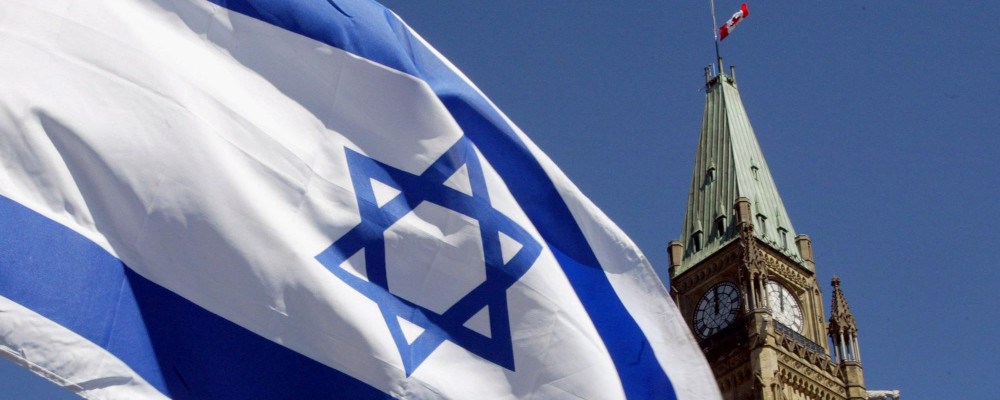The ongoing Israel-Hamas conflict has caused a lot of commentators and politicians to invoke historical arguments in favour of their particular point of view. These claims on the past typically centre on the partition of Israel and Palestine and the creation of a Jewish state in 1948. A forgotten part of this history is the instrumental role that Canada played in shaping it.
By November 1947, Lester Pearson had ventured deep into the labyrinth. There he was, serving in a tight working group set up by a United Nations sub-committee, which had been established by the General Assembly, to map out the improbable, or maybe even the impossible: a viable path to partition a blood-soaked piece of land—the Mandate of Palestine—for two different peoples with incompatible dreams. Every move that he made was scrutinized by the world’s politicians, diplomats, lobbyists, and press. No wonder he wrote in private at the time, “It certainly is the most complicated problem that I have ever come up against.”
Enveloped for centuries within a blur of Biblical kingdoms, and then after by vast empires (Roman, Byzantine, Arab, Ottoman), what came to be called Palestine had been most recently administered by the United Kingdom, on behalf of the defunct League of Nations (and Britain’s own imperial interests of course), to guide the locals to self-rule. This vague mandate from the League was greatly complicated by His Majesty’s Government’s declaration in 1917 that it viewed with “favour” a homeland for the world’s Jews in this piece of land.
By 1947, Britain had spent close to three decades nudging, cajoling, begging, threatening, and fighting with the majority Arab and the minority Jewish populations to persuade them to live together in peace or at least next door to each other in some fashion—all in vain. Burnt out by the second global war of the 20th century, forced to dump imperial pieces overboard (India, Burma), London announced it was going to pull out of Palestine as soon as possible and left the UN to confront the looming legal, civil, and military void.
In the spring of that year, the United Nations summoned member states to New York to deal with the crisis. Pearson, then deputy minister of External Affairs, was elected to chair the committee that would set up a special commission to travel to Palestine to examine the issue firsthand and make recommendations.
Pearson witnessed the rage and stakes when delegations simply discussed the commission’s terms of reference and membership. As he put it:
I’ve heard some pretty wild speeches at the United Nations…but nothing to equal the venom and the fury of the Arabs. And I don’t mean that this was some kind of synthetic fury as very often [Soviet] speeches were. This was genuine. This was sincere. This was from the depths of their being…The Jewish feeling was equally deep and equally sincere and it wasn’t diplomatic. It wasn’t a diplomatic conflict. It was a conflict of life and death between two peoples.
Canada had no political, economic, or military stake in the wider region or the immediate crisis so Pearson could afford to be a moderating voice in an intense argument. This enabled him over several weeks to stickhandle a divided UN to agree on the commission’s terms of reference and get it launched; in that angry atmosphere, no easy or inevitable achievement. He was praised by his fellow delegates and the press. One of his colleagues later wrote that “Pearson’s performance…might be regarded as the beginning of Canada’s role as a middle power.”
In the summer of 1947, the commissioners, including a Canadian representative, toured Palestine looking for a way to satisfy the political and emotional demands of the 1.3 million Arab and 678,000 Jewish inhabitants. True to the very nature of the conflict, even the commissioners sent to shape a compromise could not agree amongst themselves. The majority, including Canada, called for the partition of Palestine into Jewish and Arab states sharing a customs and monetary union, with Jerusalem placed under an international trusteeship. The minority report called for a unified federal state with Arab and Jewish provinces. The UN gathered in the fall of 1947 to discuss those divergent possibilities.
In October, Canada joined the UN sub-committee dealing with the partition option. After the initial round, the sub-committee decided it needed to focus the task at hand and Pearson was an obvious choice to dig in even deeper with a working group tackling the details. He was joined by a Soviet, an American, and a Guatemalan delegate. In that claustrophobic arena, the middle power diplomat had to balance demands from rival superpowers arguing over timetables, supervisory bodies, the scope of UN involvement, and whether to create one or two states out of one piece of land, while the clock kept running down on the looming British evacuation. Pearson confided to a friend, “Here I am, in the middle, between an obstinate Russian and a not-too-skillful American, and it has been about the most exhausting experience of my life.”
Pearson had worked over the decades to practice his craft as dispassionately as possible—one admiring colleague even called his approach “ruthlessly pragmatic”—but when it came to Palestine, he was uncharacteristically drawn in. Given his childhood, that is hardly surprising. He was raised in a deeply Christian household, both his father and grandfather had been ministers and the Bible was the all-pervasive text in their lives. The minister’s son conceded he “got too personally involved…in a very special way because we were dealing with the Holy Land and a lot of my old Sunday school stories came out of there. At one stage of my life, I knew far more about the geography of Palestine than I did about the geography of Canada.”
This childhood attachment was reinforced by postwar revelations of the Holocaust. While Pearson and his fellow diplomats were working at the UN, Jewish refugees were trying to flee from a still antisemitic Europe past British gunboats into Palestine. In that desperate landscape, many of the UN delegates including Pearson championed some kind of Jewish homeland because, as he put it, “of an underlying feeling that it had been made necessary by the slaughter of Jews in Europe…that arrangements should be made in at least one country in the world for the Jewish people to be definitely freed from the limitations and the fears imposed by minority status.” This personal and political objective meant that, from the start, Pearson ignored the claims of the Arab majority in Palestine and in the Middle East to have Palestine all to themselves. In a gesture of admiration and gratitude for his support, someone, perhaps a delegate or journalist, dubbed him, “Rabbi Pearson”. He gladly accepted the title.
Over the month of November, Pearson often thought he had reached a compromise on partition in the working group only to see it fall apart. He couldn’t force or bully the American and Soviet delegates in this tortuous process—he had to rely on endless patience, delicate deflection, and political antennae finely tuned to every possible opening. “We sat in a cell-like room”, Pearson recalled, “hour after hour after hour, and the press were out there in the corridor keeping a death watch. We went on all day and all night and finally worked out an agreement that the Russians and the Americans would both accept.” Somehow, and there is scant paper trail on this, Pearson blended elements from the American and Soviet proposals to shape an agreement over the withdrawal timeline, a supervisory commission, legal issues, and Security Council involvement.
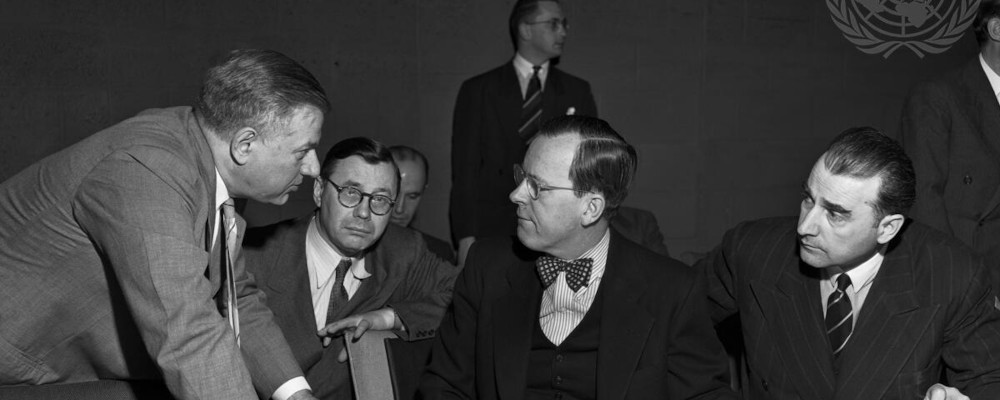
The compromise made front-page news around the world. The New York Times cheered his “tireless efforts.” The Manchester Guardian declared that his “capacity to watch a plan knocked down and then set up another should give him some special sort of status with the United Nations.” Despite the public applause, however, Pearson cautioned a journalist ally in private, “Don’t go out on any limbs, or sing any [paeans] until you see what is going to happen.”
Pearson’s draft compromise on the terms of partition moved from the working group to the sub-committee and eventually to the floor of the General Assembly. On November 29, 1947, thirty-three delegations, including Canada, voted to partition the former League of Nations mandate of Palestine into Jewish and Arab states with an economic union. Thirteen countries opposed the plan, including India, all the Arab nations, and fellow Muslim countries Afghanistan, Pakistan, and Turkey. Ten members abstained, the most significant abstention coming from Great Britain, still trying to appear sublimely neutral.
Despite the triumph for the Jewish cause at the United Nations, Pearson’s work was, in diplomatic parlance, overtaken by events. Arab nations went to war against the Jewish population in Palestine—not to create a homeland for the resident Arabs but to seize and carve up the territory for themselves. The organized, impassioned Jewish resistance prevailed. In the fighting, hundreds of thousands of Arabs fled or were pushed off their land and saw their dreams shattered. The State of Israel was born from this mesh of blood and faith, heartbreak, and joy.
Pearson looked back with pride at the creation of a Jewish homeland and with anguish at the awful violence that creation entailed but he never apologised for his fundamental decision to support a Jewish homeland. He and his fellow delegates did not have easy, ideal, or universal solutions to work with. They had made the best of contentious options, fully aware that bloodshed was likely coming no matter what choice they adopted.

In November 1948, after the war had frozen into a tense armistice, Pearson addressed the General Assembly, defending his support for partition, arguing there was no practical alternative. As he outlined:
Some form of unitary or federal state would, of course, have been preferable, but there was no possibility of forcing political unity on the Arab and Jewish peoples of Palestine in a form which would not have been bitterly resisted by one side or the other. In these circumstances, the only thing we could do was reconcile ourselves to the necessity of separation as the solution which seemed best in the circumstances.
In that same speech, he acknowledged the tragic outcome for the Arabs of Palestine who had been displaced by the war, who would be used ever afterward as political pawns by Arab governments:
I do not deny for a moment that this is a difficult circumstance for the Arab states to accept, but it is nevertheless the case and it does not seem to me that the United Nations would be doing those states any service if it encouraged them, or even permitted them, to continue their efforts destroy by force of arms the Jewish state.
In retirement, Pearson looked back on his time in diplomacy and remarked with chagrin that fear in international affairs is often the greatest inspiration to innovate, the greatest impulse to finally abandon old, blinding dogmas.
If there is one sliver of light in this current season of darkness, it may be that more and more people on both sides have possibly begun to grasp the fact that the status quo is unbearable and unsustainable. Hopefully, Israel will destroy, as it must, the terrorist Hamas organization. Hopefully, Israel’s appalling autocratic government will be thrown out, as it must. Perhaps then larger forces of decency and tolerance on both sides will emerge from the current crisis—which will end at some point—and try at last to fashion a new more humane and just state of being, with justice, peace, and security for everyone. That was Pearson’s dream of 1947.
Recommended for You
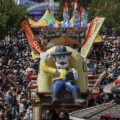
Falice Chin: The ‘wild and weird’ Calgary Stampede
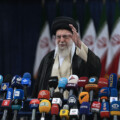
Michael Bonner: Are we witnessing the last gasp of Iran’s Islamic Republic?

Need to Know: Yahoo, Alberta! You’re doing something right

Need to Know: Mark Carney’s digital services tax disaster
